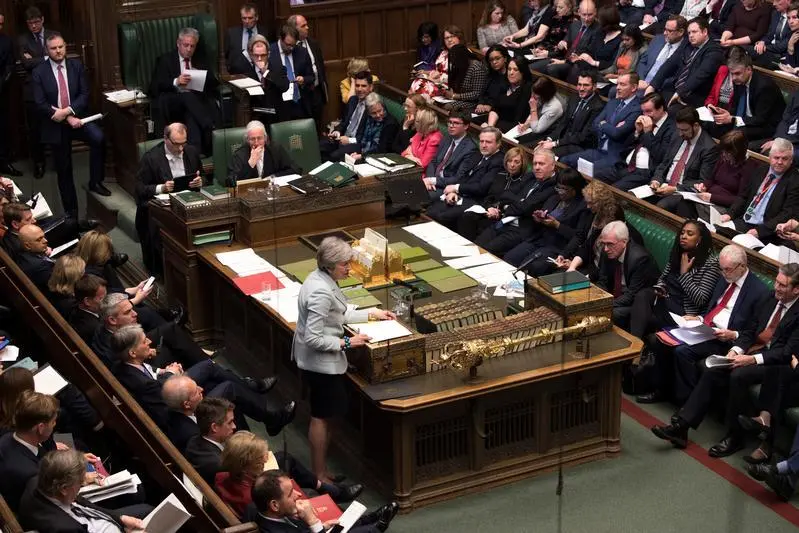PHOTO
March 29 was supposed to be the day the United Kingdom finally left the EU, just under three years after voting to do so in a referendum by 52 percent to 48 percent.
Those years have been bruising, and will leave an indelible imprint on the political psyche of all Britons. David Cameron led the Remain campaign in the referendum, and stepped down as prime minister when it lost. In came Theresa May, also a Remainer. Faced with a deeply divided country, and a Conservative party in which Brexiteers had the upper hand, she adoped Brexit with the zeal of the convert; “Brexit means Brexit and we will make a success of it,” were her first words on the subject.
But that was always going to be difficult, and May did herself and her party a disservice when she called a parliamentary election in early 2017. She lost her majority, and now governs only with the support of the 10 Northern Ireland MPs from the Democratic Unionist Party (DUP). The DUP is fundamentally opposed to anything that could separate Northern Ireland from the rest of the Union (there’s a clue in their name). They cannot, therefore, support May’s Brexit deal as long as it contains the Irish backstop. This is a failsafe mechanism which, if the EU and the UK cannot come to a trade agreement, would keep Northern Ireland in the European customs union — maintaining the absence of a hard border between the north and south of Ireland, a requirement of the 1998 Good Friday agreement that ended the Troubles, but effectively creating a new trade border down the middle of the Irish Sea.
The Irish backstop might have been dismissed as a technicality, except that May’s government needs those DUP votes. In addition, the hardline Brexit faction in her Tory party, the European Research Group, will agree only to a solution that is acceptable to the DUP.
Many accuse May of having pandered too much to the Brexit camp in her government and not sufficiently reaching across party lines to find a consensus, but the opposition Labour Party is divided on the issue too. The prime minister has now brought her Brexit deal before Parliament three times. The first time, it suffered a defeat unprecedented in parliamentary history. The second defeat was also comprehensive. In the third vote — ironically on what was supposed to be Brexit day, March 29 — she lost by 58 votes, despite offering to resign as prime minister if MPs approved her deal. Somewhat cruelly, Scotland’s First Minister Nicola Sturgeon observed that May was the first leader ever to fall on her sword, and miss.
In the meantime, Parliament itself has tried to take control of the process, by temporarily wresting control of parliamentary business from the government — again, unprecedented — to hold votes on eight alternative forms of Brexit, ranging from “no deal” to remaining in the single market and customs union, and holding a further confirmatory referendum on whatever it decides. All eight proposals were rejected, inspiring the Guardian newspaper’s front-page headline: “No, no, no, no, no, no, no, no.”
Parliament will try again next week, as will the prime minister with her own deal, but where has all this political squabbling left Britain? The current default legal position is that, unless the EU agrees to a further extension, Britain will crash out without a deal on April 12, with all the dire economic consequences that this entails.
British business is deeply concerned, and many business leaders are livid. The director general of the British Chambers of Commerce, Adam Marshall, pointed out that this was no way to run a company, far less a country. Brussels, too, is worried. No one there wants a no-deal Brexit, but unless someone can pull the proverbial rabbit out of the hat, that is where we will end up by default.
If the process continues beyond May, the UK will have to take part in that month’s elections to the European Parliament. No one is keen on that, on either side of the English Channel. For the UK government it would be tantamount to ignoring the will of the British people who voted to leave. European politicians fear that, amid the chaos, Nigel Farage’s new Brexit party might be strongly represented alongside other Brexit politicians. The EU establishment is already deeply concerned about populist voices among its member states. Reinforcement of their ranks from a country that wants to leave would be unwelcome.
French President Emanuel Macron is willing to grant the UK a further extension only if he sees a clear way forward. He is not alone in that view. European Council President Donald Tusk has called an emergency summit on April 10.
There is considerable Brexit fatigue in the EU. The issue has hijacked almost every summit agenda when there are other issues the bloc would like to discuss, such as climate change and migration.
The British people, Brexiteers and Remainers alike, feel let down. There has been no progress since the 2016 referendum, only division has flourished, and it will take a lot for these wounds to heal. The fact that no one knows what comes next only makes matters worse. The blame game is bound to intensify and cut ever deeper divisions between politicians and the general public.
And then there is the greatest irony of all. It is in the gift of the heads of government of the EU’s 27 member states to grant an extension and avoid the UK crashing out without a deal, which means that never before has Europe had so much power over the fate of the UK — when the whole point of Brexit was to “take back control.”
• Cornelia Meyer is a business consultant, macro-economist and energy expert.
Twitter: @MeyerResources
Copyright: Arab News © 2019 All rights reserved. Provided by SyndiGate Media Inc. (Syndigate.info).





















